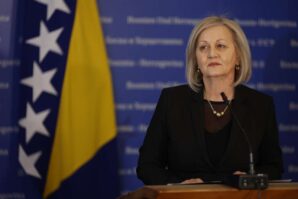
History moves in uneven steps. Just as the telegraph erased time and distance in the 19th century, today’s innovations in digital money may bring significant changes in the way we lead our lives. The shift to electronic payments and social interactions brought on by the pandemic may cause similarly rapid and widespread transformations.
The challenges are significant, and so is the potential reward. But policy action must begin immediately.
But we must look beyond the dazzle of technology and the alluring image of futuristic payment services. At the IMF, we must identify and help countries solve the deeper policy tradeoffs and challenges that are arising, the IMF writes.
The rapid pace of change is a call to action—for countries to guide, and not be guided by, today’s transformations. It is also important for the IMF to engage early with countries, and usher in reforms that will contribute to the stability of the international monetary system, and foster solutions that work for all countries. There is a window of opportunity to maintain control over monetary and financial conditions, and to enhance market integration, financial inclusion, economic efficiency, productivity, and financial integrity. But there are also risks of stepping back on each of these fronts. We must enact the right policies today to reap the gains tomorrow.
We emphasize this in two papers published today, one on the new policy challenges, and one on an operational strategy for the Fund to engage with countries on the digital money revolution.
Digital money developing rapidly
Digital forms of money are diverse and evolving swiftly. They include publicly issued central bank digital currencies (CBDC)—think of these as digital cash, though not necessarily offering the same anonymity to avoid illicit transfers. Private initiatives are also proliferating, such as eMoney (like Kenya’s mobile money transfer service MPesa) and stablecoins (digital tokens backed by external assets, like USD-coin and the proposed Diem). These are digital representations of value that can be transferred at the click of a button, in some cases across national borders, as simply as sending an email. The stability of these means of payment, when measured in national currencies, varies significantly. The least stable of the lot, which hardly qualify as money, are cryptoassets (such as Bitcoin) that are unbacked and subject to the whims of market forces.
These innovations are already a reality, and growing rapidly. According to IMF data, CBDCs are being closely analyzed, piloted, or likely to be issued in at least 110 countries. Examples range from the Bahamas’ Sand Dollar already in use, to the People’s Bank of China’s eCNY pilot project, to countries like the United States where the benefits and drawbacks of a digital dollar are still being studied. Stablecoins, still esoteric two years ago, tripled in value in the last six months (from $25 billion to $75 billion), while cryptoassets doubled (from $740 billion to $1.4 trillion). And adoption is global. eMoney accounts are not only growing much more rapidly in low- and middle-income countries than in the rich ones, but are now also more numerous. Africa, in particular, is leading the way.
Opportunities are immense. A local artisan can receive payments more cheaply, potentially from foreign customers, in an instant. A large financial conglomerate can settle asset purchases much more efficiently. Friends can split bills without carrying cash. People without bank accounts can save securely and build transaction histories to obtain micro-loans. Money can be programmed to serve only certain purposes, and be accessed seamlessly from financial and social media applications. Governments can tax and redistribute revenues more efficiently and transparently.
Policy implications—opportunities and challenges ahead
We may well reap these benefits, but we must be aware of risks, and—importantly—of the bigger policy implications and tradeoffs. The challenges to policymakers are stark, complex, and widespread.
The most far-reaching implications are to the stability of the international monetary system. Digital money must be designed, regulated, and provided so that governments maintain control over monetary policy to stabilize prices, and over capital flows to stabilize exchange rates. These policies require expert judgment and discretion and must be taken in the interest of the public. Payment systems must grow increasingly integrated among countries, not fragmented in regional blocs. And it is essential to avoid a digital divide between those who gain from digital money services and those left behind. Moreover, the stability and availability of cross-border payments can support international trade and investment.
There are also implications for domestic economic and financial stability. The public and private sectors should continue to work together to provide money to end-users, while ensuring stability and security without stifling innovation. Banks could come under pressure as specialized payment companies vie for customers and their deposits, but credit provision must be sustained even during the transition. And fair competition must be upheld—not an easy task given the large technology companies entering the world of payments. Moreover, governments should leverage digital money to facilitate the transfer of welfare benefits or the payment of taxes. Scope even exists to bolster financial inclusion by decreasing costs to access payment and savings services.
Finally, new forms of money must remain trustworthy. They must protect consumers’ wealth, be safe and anchored in sound legal frameworks, and avoid illicit transactions.
The challenges are significant, and so is the potential reward. But policy action must begin immediately. This is the time to establish a common vision for the future of the international monetary system, to strengthen international collaboration, and to enact policies and establish legal and regulatory frameworks that will drive innovation for the benefit of all countries while mitigating risks.
Choosing the right path now is critical. Regulation, market structure, product features, and the role of the public sector can quickly ossify around less desirable outcomes. Backtracking later can be very costly.
The IMF has a mandate to help ensure that widespread adoption of digital money fosters domestic economic and financial stability, and the stability of the international monetary system. We plan to engage regularly with country authorities to evaluate country-specific policies, provide capacity development to avoid a digital divide, and develop analytical foundations to identify policy options and tradeoffs.
To do so, the IMF must deepen its expertise, widen its skillset, ramp up resources, and leverage its near universal membership. Still, we cannot do this alone. The challenges are so complex and multifaceted, that collaborating closely with other stakeholders is necessary. The World Bank, the Bank for International Settlements along with its Innovation Hub, international working groups and standard-setting bodies, as well as national authorities, are all complementary partners, each with its specific mandate and skillset. By joining hands, we will help households and firms leverage the benefits and avoid the pitfalls of the digital money revolution.














